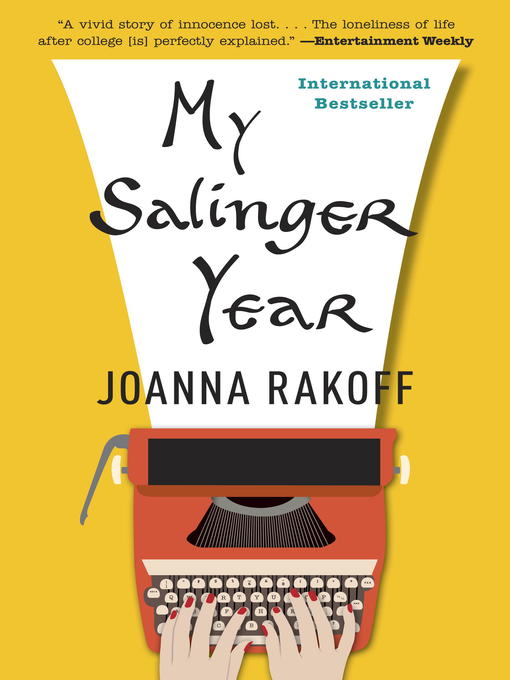
My Salinger Year
کتاب های مرتبط
- اطلاعات
- نقد و بررسی
- دیدگاه کاربران
نقد و بررسی

February 24, 2014
Rakoff’s second book (after A Fortunate Age) is a reflective account of her experiences working in publishing during the mid-1990s, a time when key players in the industry were adjusting to many technological advancements, as well as a unique look at the often misunderstood J.D. Salinger. Having moved back to New York after earning a master’s at a London graduate school, Rakoff takes a low-paying secretarial job at a respected but old-fashioned literary agency (she wrote in a Slate article that it was Harold Ober Associates) that represented high-profile authors such as Judy Bloom and Salinger among others who remain unnamed. Ending her relationship with her “college boyfriend,” Rakoff rented a run-down apartment in the burgeoning but not-yet-gentrified Williamsburg with her new boyfriend, the anti-establishment Don, who spent his time working on his novel while she was away at the office. When an editor from a small press expressed interest in publishing one of Salinger’s minor and nearly forgotten stories, Rakoff began an ongoing correspondence with Salinger, and formed a tender connection with the man that prompted her to read his work, beginning a late-bloomer’s love of an elusive writer. This is a vibrant coming-of-age memoir that moves along with momentum and energy, and one only wishes Rakoff had spent more than one year with Salinger so we’d have an even fuller portrait of a man who was and is often misunderstood.

May 15, 2014
A sharply observed coming-of-age memoir about an aspiring writer's entry-level job at a fading literary agency.Though Rakoff earned acclaim for her debut novel (A Fortunate Age, 2009), her memoir is more engaging, particularly for its mastery of tone. The author establishes herself as something of an innocent, a master's grad who wanted to write poetry but required a job to tide her over. She found one at an unnamed literary agency that continued to operate with typewriters and fax machines and where her boss's main responsibility was the nonbusiness of J.D. Salinger. It would be easy for a satiric hipster to have satirical fun with the material-particularly with the onslaught of letters from generations of Salinger fans who actually expected (or even demanded) a response-but Rakoff isn't that sort of author. She reserves just the slightest bit of judgmental irony for herself and for her boyfriend, a socialist, boxer and aspiring novelist. Her family recognized that she was a glorified secretary at a menial job that would bring her no closer to fulfilling her literary ambitions and didn't provide her with sufficient salary to pay her bills. Against her boss's admonitions, she developed something of a telephone relationship with Salinger (whom she'd never read before taking the job), finding him "never anything but kind and patient. More so than plenty of people who called the Agency. More so than plenty of his fans." Eventually, Rakoff fell in love with his books, established correspondence with some who wrote him (and learned why a form letter was previously the standard response), assumed more responsibility as a manuscript reader and something of an agent herself, and left the agency as a published poet.Many of the mysteries of the literary world remain mysteries to the author, but she provides good company as she explores them.
COPYRIGHT(2014) Kirkus Reviews, ALL RIGHTS RESERVED.

March 15, 2014
Following her debut novel, A Fortunate Age, Rakoff returns with a debut memoir. It's the early Nineties, and Rakoff, disenchanted with her graduate studies in London, decides she would rather write poetry than analyze it. Chasing this ambition, she flees to New York City and tries to make ends meet by working as a temp at a literary agency. The agency, although frozen in the time of chain-smoking bosses and Selectric typewriters, represents a long list of celebrated clients, including J.D. Salinger himself. Rakoff, who has not actually read any of Salinger's novels, finds herself swimming in Salinger fan mail and typing--on an actual typewriter--responses on the reclusive writer's behalf. Meanwhile, at home, she struggles to keep warm, let alone pursue her literary aspirations. She shares her crumbling Brooklyn apartment with her dubious boyfriend, Don, a competing writer. VERDICT This honest, introspective, and completely compelling story is sure to appeal to readers who are obsessed with the enigmatic Salinger, but it is intended for those who have experienced (or are experiencing) their own bluesy, confused, post-college Salinger Year. Rakoff is a careful observer and endearingly human. Her coming-of-age story is a gentle reminder that we are all, still, coming of age. [See Prepub Alert, 1/6/14.]--Meagan Lacy, Indiana Univ.-Purdue Univ. Indianapolis Libs.
Copyright 2014 Library Journal, LLC Used with permission.

Starred review from June 1, 2014
Rakoff, the author of a much praised first novel, A Fortunate Age (2009), chronicles her year working at the problematically retro New York literary agency that had been representing the reclusive, nearly deaf, and still demanding J. D. Salinger since 1942. It's 1996, and Rakoff's chain-smoking boss is loud and cryptic. There is no computer on the premises, and Rakoff's nebulous responsibilities entail using an ancient Dictaphone and handling Salinger's heart-battering fan mailhundreds of letters from lonely, angry teens and grateful military veterans who recognize in the author one of their damaged own. A poet involved with an unsavory, wannabe novelist, Rakoff misses her far more reliable college boyfriend. She finds her low-wage job enchanting, intimidating, ludicrous, and, briefly, thrilling when Salinger pitches the agency into a tizzy by allowing a teeny-tiny press to turn Hapworth (1965), his last published story, into a book. As Rakoff recounts her funny and wrenching personal predicaments, she also charts the quiet battle of attrition between the values of the old publishing world, personal and impassioned, and the aggressively invasive corporate imperative. An intriguing look at the ever-fascinating Salinger and a gracefully incisive tale of love and literature, creativity and survival.(Reprinted with permission of Booklist, copyright 2014, American Library Association.)

























دیدگاه کاربران